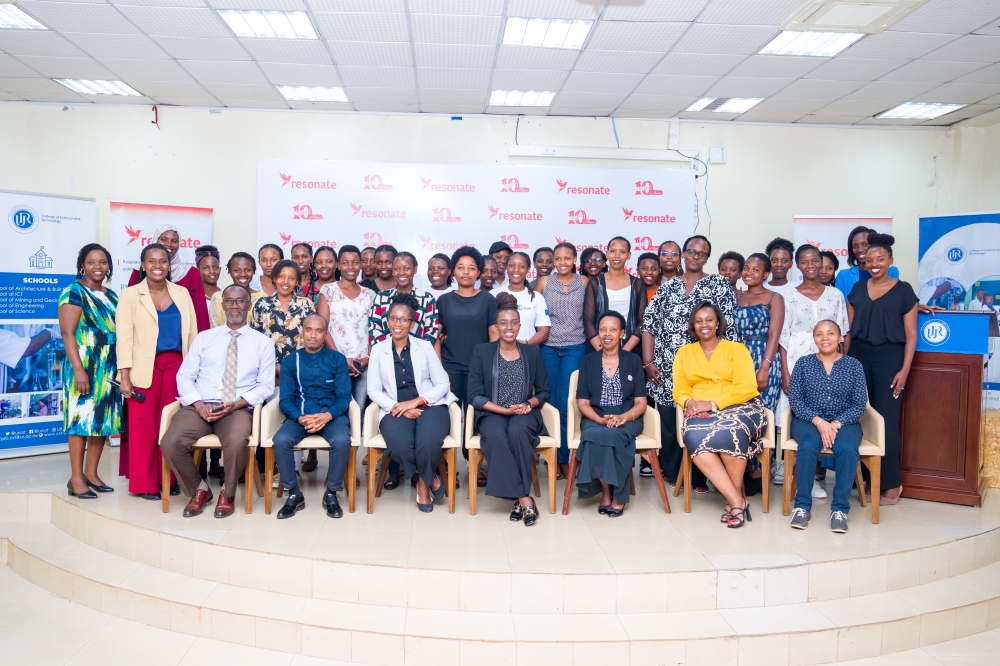Rwanda is actively promoting opportunities for girls to excel in science courses, with a strong emphasis on STEM subjects. The government of Rwanda has prioritised STEM education as a key component of its Education Sector Strategic Plan, spanning from 2018/19 to 2023/24.
The government’s objective is to transform into a knowledge-based economy by prioritising the development of scientific and technological skills, particularly among girls.
Education and beyond
“It all begins with a willingness to explore. While learners may naturally gravitate towards certain art subjects in which they excel, it is crucial for them to receive career guidance in order to make informed decisions for their future,” advises Jolly Mazimhaka, an experienced educationist and academic specialist.

In addition to creating networks for themselves, she emphasised the importance of girls in STEM finding supportive friends, seizing opportunities, and participating in events within the field.
“There is more to offer aside from education, for example learning soft skills like presentation, time management, leadership, problem-solving, teamwork, and more,” she noted.
Mazimhaka advised girls to acquire technological skills by taking advantage of the free internet available at universities, and to gain knowledge in their desired industry.
She emphasised that excelling in STEM courses requires both a mentor’s guidance and the cultivation of self-assurance. Additionally, she encourages girls in STEM to establish LinkedIn profiles, enabling them to highlight their professional experience, skills, and achievements for prospective employers and clients.
“There are many opportunities that favour women and girls in the workspace in Rwanda, take use of them,” Mazimhaka heartens young people.
Obstacles
Jennifer Batamuriza, the vice president of the Rwandan Association of Women in Science and Engineering (RAWISE), highlighted that some girls are discouraged from pursuing STEM courses due to disadvantaged family backgrounds and a lack of role models in the field.
To this, she said excelling in STEM doesn’t require a wealthy family, stressing that hardships shouldn’t hinder one from trying to achieve their goals.
“A number of girls question if they will acquire jobs after pursuing STEM courses, which hinders them from pursuing these courses in the first place. However, there are many jobs waiting on them in and beyond Rwanda if they are skilled and knowledgeable,” Batamuriza said.
She explained that a major obstacle for certain graduates in finding employment is their inability to effectively communicate during job interviews and their lack of necessary skills.
Batamuriza said girls ought to back up their skills with discipline, hard work, and persistence.
“Even when you fail, many times, push harder until you excel. You have to also have passion to drive you.”
According to Gaelle Nsengiyumva, the president of Girls in ICT Rwanda, both girls and boys have equal opportunities, and thus, there is no reason to not seize the opportunity.
“One has to focus on the priority, some girls waste too much time in salons, on make-up, and following fashion trends, a thing that distracts them thus losing concentration, Nsengiyumva adds.
She encourages girls to prioritise reading as it helps them gain understanding and strive towards their ambitions.
Diversifying skillset
Noella Mupole, a specialist in information management and systems, said girls and women should learn more languages, as that way, they will boost their presentations, and expand job opportunities.
She added that they should also learn outside their assignments, exercise thinking, and opt for online courses to improve their skills.
According to Robert Katabarwa, the emerging technologies senior technologist at the Ministry of ICT and Innovation, everyone with an idea can impact the community, for instance by joining the community of practice, IT sectors, for instance, blockchain, and others.
Katabarwa emphasised that despite the challenges in STEM, it is important to strive for personal excellence as opportunities arise. He emphasised the need to seize these opportunities or create them if they are not readily available.
He urged graduates and soon-to-be graduates to focus on building their qualifications, rather than worrying about finding jobs.
“Jobs are not a problem, but do you have what it takes to get them? There are people who have established businesses in Rwanda, serving high-end markets, one can even employ 1,000 graduates to serve the bigger markets in Canada, Europe, and so forth,” he said.
Dismissing gender norms
Claire Uwineza, the CEO of Resonate, said women have the potential and skills to make the change they want to see in their lives and community, but they are hindered by bias, gender norms, and stereotypes, which makes them undermine their possibilities.
For this reason, Uwineza recently inaugurated the Rise and STEM programme, designed to help and encourage girls and women to join STEM and stay in the field.
This programme also aims to provide capacity-building and leadership training to support women and girls in overcoming the cultural and economic setbacks of working in strongly male-dominated industries.
“Most women join STEM but drop out because it is mostly a male-dominated field. As a country, and worldwide, we are losing diversity. Some research indicates that diversity leads to more innovation and problem-solving abilities,” Uwineza said.
She believes that when girls join STEM, they already have hard skills, but lack the confidence and resilience to stay, stressing that succeeding requires discipline and confidence.
“They have the tools and the skills, this is why we want to empower them to thrive despite the challenges.”
Uwineza calls upon girls to believe in themselves and learn from other women who have succeeded in this field.
Gloria Uwineza Mutabaruka, a first-year student of computer science at the College of Science and Technology, University of Rwanda, explains that even though STEM subjects are hard, having women role models in these fields proves that it’s possible to excel.
“Hearing women who have outrivalled to the level of doctorate share their testimonies, is a reminder that they didn’t achieve the excellence easily, but pushed passed their limitations, challenges, and stereotypes,” she said.
SOURCE: TNT






